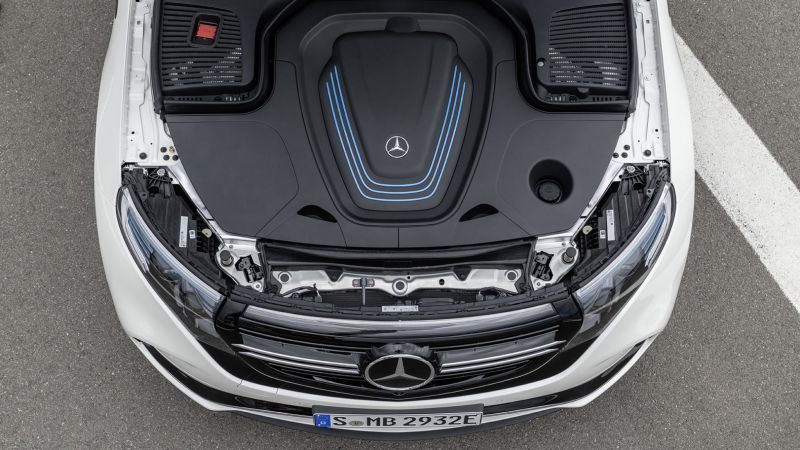
At last, Mercedes has given the world a sneak peak at its battery-powered electric EQC crossover before it goes into production next year. It’s a highly anticipated arrival in the electric car market, as it’s expected to kick off some lively competition between itself and the Audi e-tron. But Mercedes have decided to forego some of the current standards of EV design in favor of a more traditional combustion-engined style.
Namely, Mercedes isn’t caving to the front truck—”frunk”, as the kids are calling it (do we really have to call it that?)—trend. Because efficiency.
A front truck is exactly what it sounds like. An electric power unit requires a lot less space than a traditional combustion engine. They’re nowhere near as big, and they have a lot less extra components. EV manufacturers like Tesla have capitalized on that by adding “trunk space” to the growing list of incentives to go electric. In addition to the rear trunk, electric cars have a trunk in the front, too.
Going electric has enabled a lot of manufacturers to get creative incorporating extra space into their designs. If you’re already redefining the way we think about power, why not play with design, too?
Well, Mercedes is keeping things a little more traditional. Pop the hood of the EQC and you’ll find the front drive module, which houses the motor and single-speed transmission. Or, the EV equivalent of peeping into the engine bay.
Advertisement
According to Carscoops, that all comes down to efficiency.
Merc, unlike Tesla, already produce combustion-engined cars. Drastically changing form and function for their EV program would mean they’d basically need even more equipment to manufacture them. Putting the powertrain where an IC would be means they can manufacture the EQC on the same production lines as the rest of their cars until it comes time to fit the thing that makes it go vroom.
Being able to make the EQC on the same line as the C-Class, GLC, and GLC Coupe means they’ll be able to keep the costs of production down, therefore keeping market costs of the EQC down.
Advertisement
It’s also a pretty smart maneuver in general. Mercedes just subtly flexed their prowess in the auto industry by showing that they’re able to adapt all their plants to adapt to EV production, should there be demand for it.
It’s a very smart move by the German car maker. They might not be able to claim the extra storage space, but Mercedes is proving they’re going to be a manufacturer that can get you an EV faster and more effectively than the competition.













